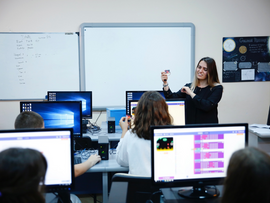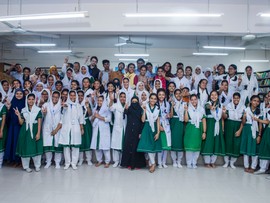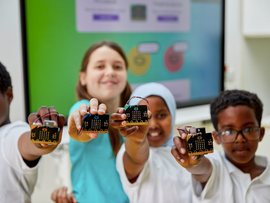Kids rise to the 'do your :bit' challenge
Young people combine creativity and technology in solutions to the Global Goals
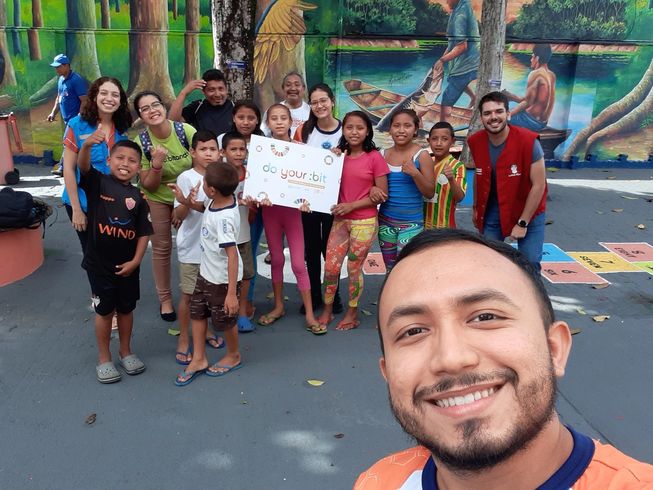
Warao children in Brazil participating in 2020's do your :bit challenge
- 1,000+entries
- 54%of entries included girls
- 50+countries involved
The 'do your :bit' challenge is an international competition for 8-to-14-year-olds (extending to 18-year-olds in 2021). For the 2019/20 challenge, entries were submitted in from over 50 countries on every continent.
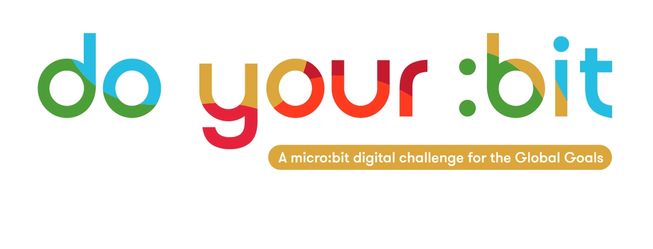

Students (especially many girls) become more enthusiastic about digital learning when you add social purpose...

Allison Bellwood, World's Largest Lesson
By taking part in the challenge, young people are immersed in creative exercises with technology to provide solutions to the Global Goals for Sustainable Development. In 2019/20 for example, children explored issues which affect their local communities, from climate change and deforestation, to water pollution and animal welfare.
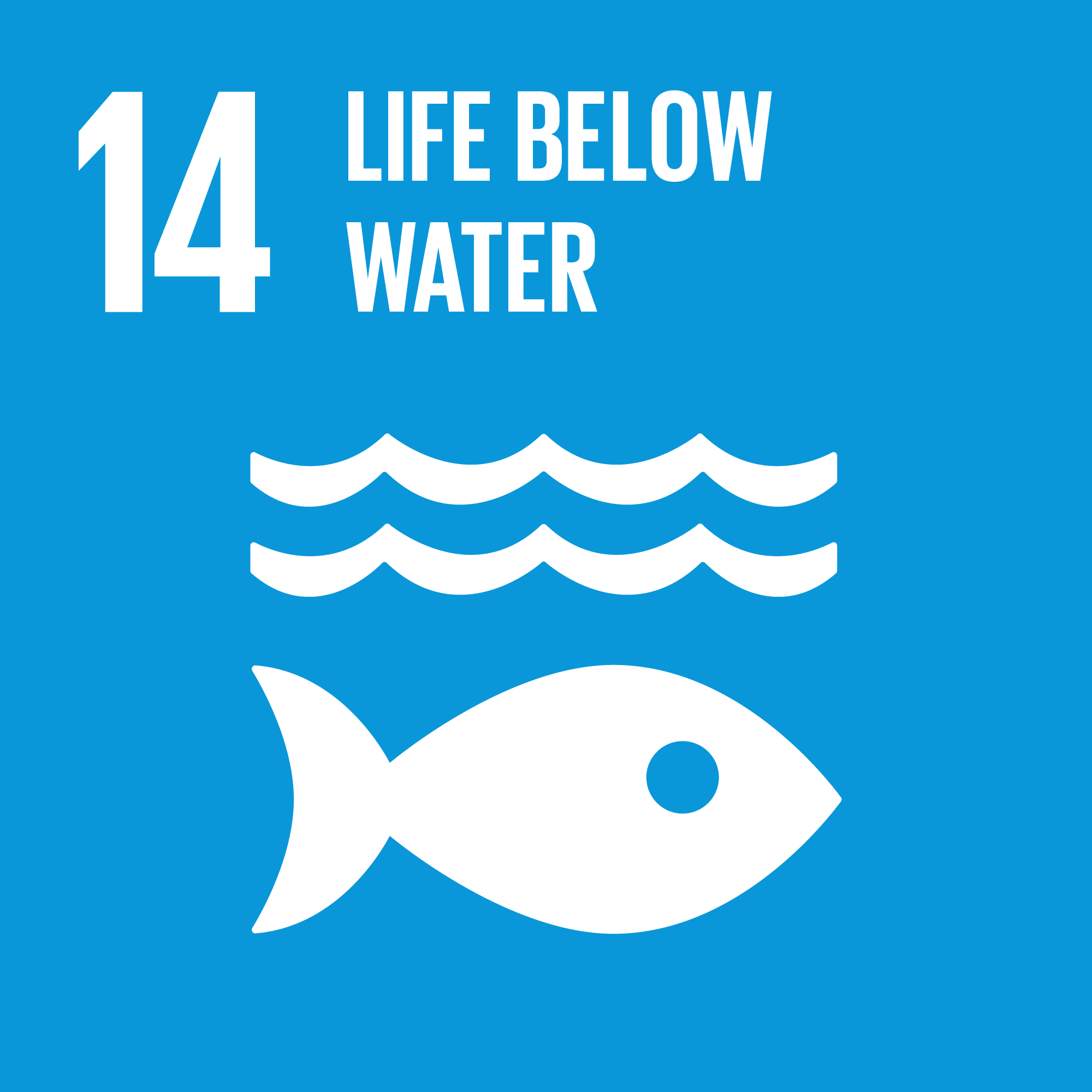
The 2020 do your :bit challenge focused on the Global Goal 14 Life below Water & Goal 15 Life on Land
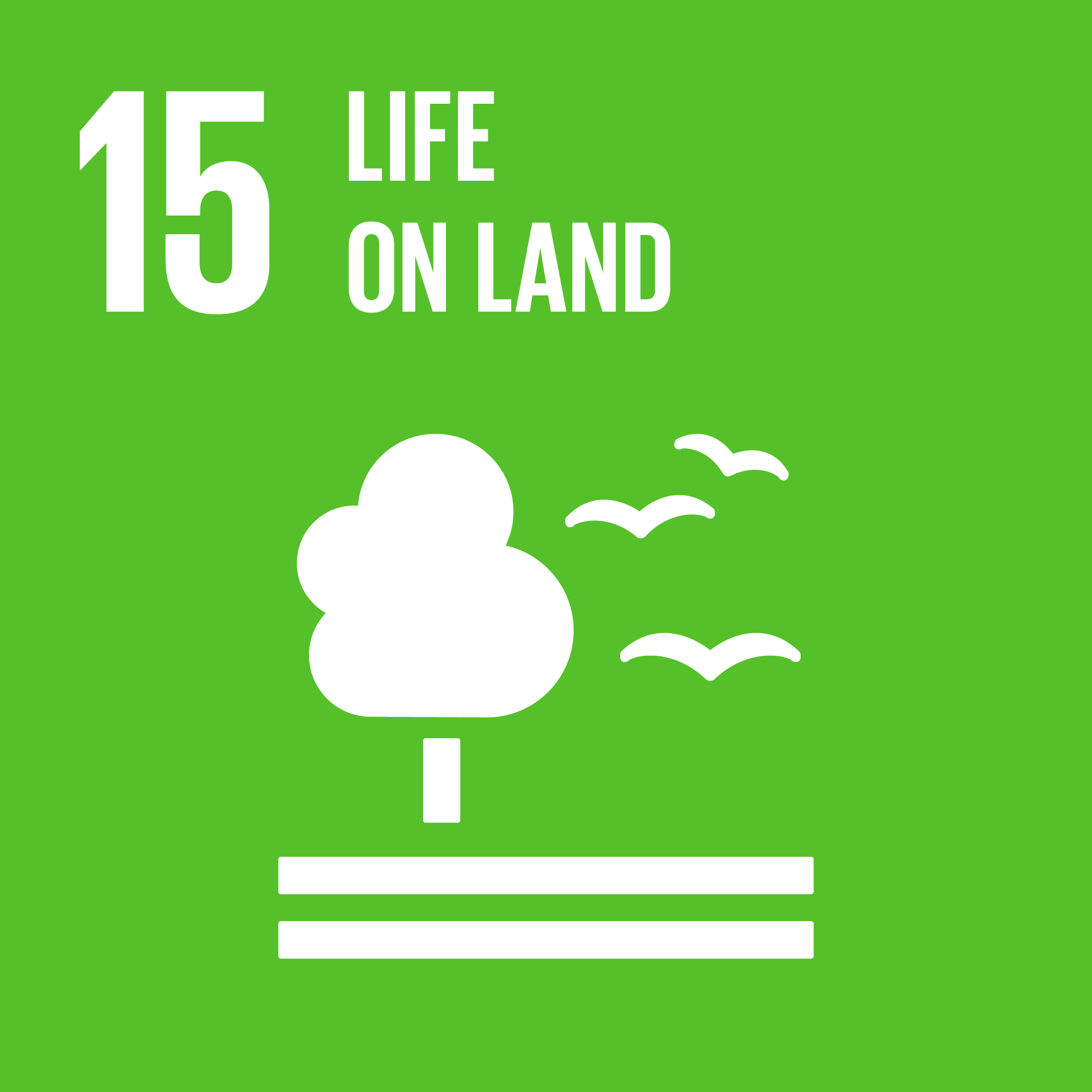
Kids all over the world take part in workshops and hackathons which provide the hands-on experience of coding and prototyping with the micro:bit. They learn about the Global Goals and are encouraged to develop their ideas to solve problems with technology. For many young people, this is their first experience of getting hands-on with coding.

The do your :bit challenge has been a fantastic way to help students channel their passion for improving the world into learning skills for the future.

Allison Bellwood, Creator and Director, World's Largest Lesson
The entries submitted for the challenge in 19/20 offered a wide range of innovative prototypes and concepts, from solutions to protect sharks in Costa Rica, raise awareness of deforestation in the USA and reduce oil spillages in Nigeria.
Solutions to local issues
Young participants in Mauritius took their micro:bits to the beach where they learned about the environmental challenges facing their island. This helped to engage and inspire them to come up with creative ways to protect their habitat.
Once they explored the functions of the micro:bit in the classroom, each child created a prototype from cardboard as a solution to some of the environmental issues they had been exploring on the beach that day.

One girl held a micro:bit for the first time at 8am on the beach... by 3pm she'd programmed the device as part of an invention.

Tasneem Abbasakoor, British Council Teacher, Mauritius
An 11 year old girl invented an alarm with the micro:bit which would sound if temperatures above 60c were recorded; this could then help to alert emergency services to potential forest fires. "She held a micro:bit for the first time at 8am on the beach... by 3pm she had programmed the device," said Tasneem Abbasakoor, a British Council Teacher in Mauritius.
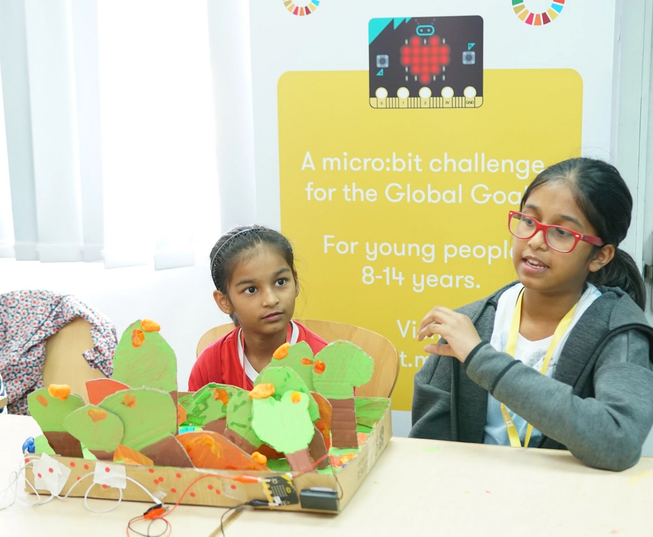
Tashi, 11 years old, with her micro:bit fire alarm designed to protect against forest fires
By taking part in do your :bit, young people are able to see opportunities to make changes for the better on the local and global scale. Such as the school children in Singapore who designed and built a food waste reduction system in their school lunch hall. Or the young person who designed and prototyped a river waste monitoring system for their city in Brazil.
Inspiring girls
Lynn Lewis is a secondary school student in the US, and according to her teacher, she had never really seen herself as someone who is good with technology. Lynn decided to take part in the do your :bit challenge along with her classmates, and went on to develop and build a winning solution to raise awareness of deforestation.

I saw first hand the hard work and positivity she displayed when things didn't work out. I couldn't be happier that she was the one to win it.

Kurt Robinson, Innovation & Arts Teacher, MA
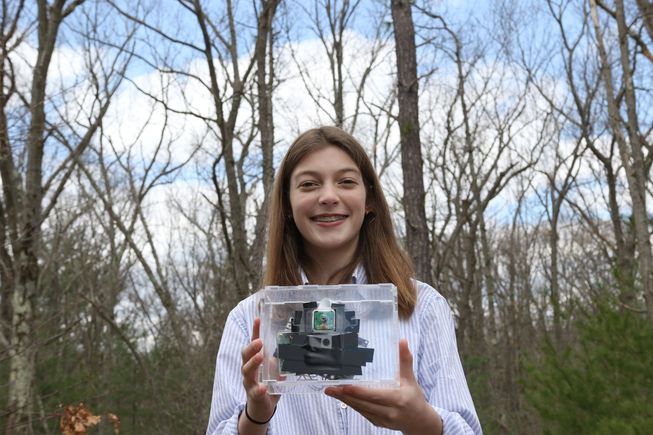
Lynn Lewis - North American winner 2020
Her teacher Kurt Robinson, an Innovation and Arts Teacher in Massachusetts, saw how hard Lynn and her classmates worked to come up with solutions, and to keep trying even when things did not always work as expected.
“All of my students worked very hard on their projects and are very passionate about helping to make the world a better place. Lynn has never really seen herself as someone who is good with technology and I saw first hand the hard work and positivity she displayed when things didn't work out. I couldn't be happier that she was the one to win it and I hope it gives her the confidence to keep going.” - Kurt Robinson
Access for all
The do your :bit challenge aims to broaden participation for those who might otherwise lack access to technology, so that more young people understand how the digital world works on a technical level.
This is driven by the Foundation’s objectives to enable and inspire all children to participate in the digital world with particular focus on girls and those from disadvantaged groups.
Challenge workshops offer young people the opportunity to gain knowledge and experience by getting hands-on with abstract code brought to life in creative physical computing activities.

This group of kids haven't learnt to read and had never used a computer before. But now they can code, with the micro:bit.

Tiago Cauassa, Technology Teacher, Brazil
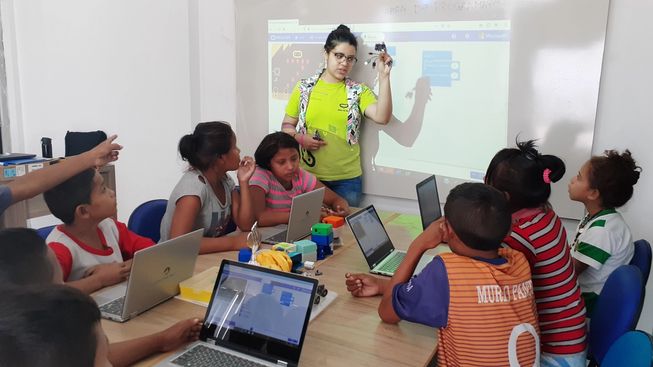
Young Warao people take part in a coding lesson introducing the micro:bit
Workshops for young Warao people - an indigenous people from the Orinoco Delta in Venezuela - now living in Brazil, were organised by volunteer teachers to increase the children’s access to education. Their lessons explored the challenges of life on land and under water with the Global Goals and introduced children to the micro:bit, taking their first steps into coding and creating with technology.
This group of 8-14-year-olds produced a working prototype alarm system using sensors on the micro:bit, to protect trees in response to the devastation of illegal deforestation.
The power of partnerships
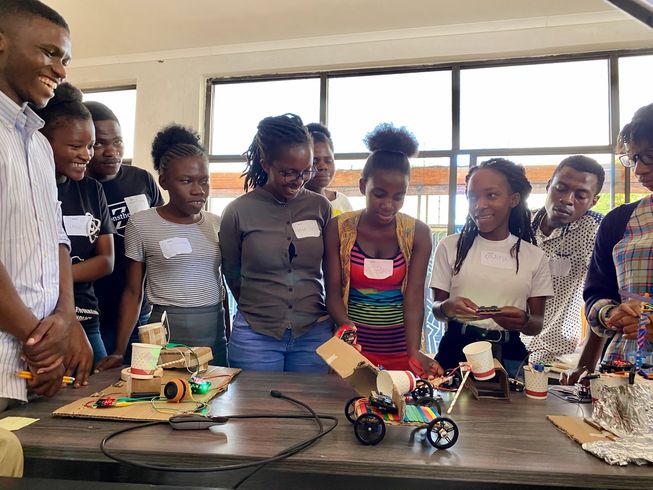
Students in Malawi presenting their micro:bit inventions
In Malawi, do your :bit hackathon workshops and training were supported by Arm and delivered by British Council, mHub and Institute of Imagination, with 15 local teachers and 33 students from Mtandire village in Lilongwe taking part. Through these activities, the students created solutions to issues in their village using the micro:bit, with many children using a computer for the first time. Up to 100 of these innovations were then entered into the do your :bit challenge.

How the children’s ideas for their micro:bit inventions were linked to helping their local community was inspiring.

James & Helen from iOi, Institute of Imagination
Global citizenship

We would like children to think that they are a part of a larger global community.

Wilson Shum, CEO SCALE InnoTech, Hong Kong
Wilson Shum, CEO of SCALE InnoTech in Hong Kong, supported the challenge as a partner, organising Global Goals and micro:bit workshops for young people. As with all our partners, Wilson recognises that participation in the do your :bit challenge offers young people a valuable global and local perspective gained in the experience.
“We would like children to think that they are a part of a larger global community, and through the process of understanding and help solving problems from the Global Goals, they take ownership of the challenges ahead of them and learn to be a responsible global citizen.” - Wilson Shum, SCALE InnoTech, Hong Kong.
One of the highlights for young people who participate in the do your :bit challenge is working together on solutions to help their local community and environment, while also being part of something truly global.

This allows them to gain confidence and feel part of a global movement.

Teacher statement, Plan Ceibal's survey
In a teacher survey run by Plan Ceibal - a major education charity in Latin America, the value of taking part is explained, "The workshop was a good experience for students from many different contexts to have access to an international level competition. This allows them to gain confidence and feel part of a global movement, and to understand what they do is not far from what other young people like them do in the rest of the world.”
do your :bit returns
do your :bit returns in 2021 and is produced by the Micro:bit Educational Foundation in partnership with the British Council and World’s Largest Lesson.
Find out more detail about 2021's challenge and how to enter here.
If you would like to find out ways you can support the challenge, get in touch here.
https://worldslargestlesson.globalgoals.org
https://www.britishcouncil.org/work/partner/coding-mauritius
